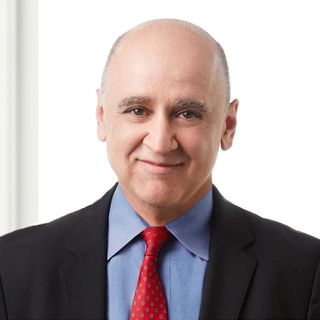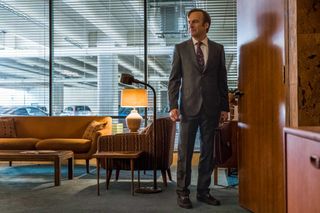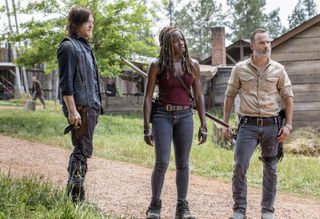AMC’s Madden ‘Walking’ Tall After First Year

Why This Matters: The time that cable networks have to develop shows into hits has been a boon to AMC programming chief David Madden.
David Madden, president of original programming at AMC, SundanceTV and AMC Studios, recently marked his first anniversary in the role. He came from Fox, where he spent 17 years, departing as president of entertainment.
Madden called his new gig “a dream job” with a lively studio and popular series such as The Walking Dead, which premiered season nine on Oct. 7, and Better Call Saul, whose season four finale airs Oct. 8. AMC’s newer entries include Lodge 49 and The Terror, while SundanceTV series include The Split and The Road to Jonestown.
Madden spoke with B&C senior content producer Michael Malone about what drew him to AMC, the new season of The Walking Dead, and competing with the streaming giants. An edited transcript follows.
What is the biggest difference between working in cable versus broadcast?
The biggest difference is time. I really enjoyed my broadcast experience. I got a lot out of it; it was an incredible education to observe how an environment like that works. But I was responsible for 15 hours of original programming every week. The day you get there, they hand you a very long document that they call The Squares, which is basically, a square for every hour of primetime for the next two years, and your job is to fill those squares. As long as it’s visible and in color and in focus, that’s really what matters. Obviously, there’s a desire for quality, but speed is everything. Volume is everything.
In cable, and especially at a place like AMC, you’ve got time to develop things right. You’re not beholden to a broadcast development calendar that is ruthless and rigid. You can get the scripts to the right place. You have the time to cast them correctly, to find the right director, the right way to shoot it.
Broadcasting & Cable Newsletter
The smarter way to stay on top of broadcasting and cable industry. Sign up below
Between scripted and unscripted and co-productions, I’ve got 24 shows that I work on. Taking the right amount of time to make the shows properly is the biggest difference to me.
What about the AMC job got your attention?

Two jobs ago, I was at a company called Fox TV Studios and I was based at Fox. We were making shows for a variety of different cable platforms and I had the opportunity to make The Killing for AMC. Not only was I really proud of the show, but it gave me an opportunity to meet Charlie Collier [president and general manager, AMC, SundanceTV, AMC Studios], Susie Fitzgerald [executive VP, programming, AMC and SundanceTV] and Ben Davis [executive VP, programming, AMC Studios] and a lot of the people at AMC, so I had a chance to experience the culture. What I liked about that culture, which I’ve only grown to appreciate that much more by being inside it, is how much concentration there is on quality, on taking risks in storytelling, in casting. Patty Jenkins — who hadn’t worked much in the previous few years — not only did she win the DGA Award for directing that pilot, but she went on to direct Wonder Woman and is now one of the hottest directors in the business. That was a chance that AMC was willing to take, as well as with Joel Kinnaman and Mireille Enos in the casting.
I also really liked the fact that it was a network that had done well by making high-quality shows, whether they be Mad Men and Breaking Bad, or subsequent shows like The Walking Dead or Better Call Saul. Here’s a network that had won by making quality first, and that was very appealing to me.
Can AMC get back to a period where it’s got shows of the Mad Men and Breaking Bad caliber, or is it not even fair to compare?
As somebody who watched all of Breaking Bad as a consumer and, up until a year ago, watched all of Better Call Saul as a consumer and last year as an executive, I think Better Call Saul is absolutely in the company of those two shows. Saul is certainly one of the elite shows on television right now.
The Walking Dead aims for different things than Mad Men or Breaking Bad did, but its track record as an audience-pleasing show is undeniable. This year we’ve launched three shows, Lodge 49, Dietland and The Terror, and I think all three are really high-quality pieces that critics responded well to.
Mad Men occupied a unique place in the culture because there were a lot fewer shows on when it launched. There’s now a lot more for us to compete with, but I think we’re still operating at a pretty high level.
What can viewers expect to see this season on The Walking Dead?

The season will feel different. The last couple of seasons were marketed as all-out war, and you saw that the effort to really build to the conclusion of the Negan story was pretty violent and intense, which is not to say season nine doesn’t have that level of intensity. But we have a new showrunner, Angela Kang, and she’s brought in a different feel, and there are a lot of new characters. We’re doing a bit of a time jump, so you’ll see that the world has changed for our principal characters. The relationships have moved in really interesting new directions. Unexpected romances may have started to flower. It’s also a world that has moved on a bit from what we last saw. You’re going to see a lot more people on horseback because they’ve run out of gas. They’ve had to civilize a bit and figure out how to forge a peace after all those years of all-out war.
The show will look and feel different, and it will obviously take its cues, as it always has, from Robert Kirkman and the comic book.
Dietland was so timely. Why didn’t that work?
I wish I knew. We were extraordinarily proud of the show. The show was greenlit in August [2017] and the first Harvey Weinstein [sexual harassment] article came out in October, so the timing was accidental. We weren’t smart enough to know that an entire world-changing movement was coming. But it was clearly in sync with something going on and we were proud of the show, proud of what Marti [Noxon, showrunner] and her creative team did.
Unfortunately, the audience did not stay with the show in the way that we wanted. It was painful not to continue the show, but ultimately, one of the frustrations of this job is, you have to look at numbers and they did not give us what we needed to justify a second season.
How daunting is it to compete with the streaming services?
It is daunting, but it’s an interesting challenge that sometimes we’re surprisingly successful at rising to. There are occasions where a streaming service will put an astronomical amount of money on the table and it’s something we feel we cannot compete with; there are talent deals being made at staggering sums that we would just not engage in.
But there are also a lot of situations where writers, producers, even actors and directors, look at what happens when they put a show out with a streaming service and it gets lost in the mass of volume on those services. A network like ours, or HBO, FX or Showtime, we curate the shows, which bolsters the development process, production process, marketing process, publicity process — the entire process it takes to crack the culture. We work really hard on our shows. We work on them one at the time. We don’t launch five shows a week. Each show we launch, the entire company focuses on it for a period of time and says, where is the opportunity for this show to crack the culture?
What are your thoughts on releasing a whole season on Premiere Day?
We did that on The Terror, where all 10 episodes were available on AMC Premiere, and the show continued to air on a linear basis, week by week. We did the same thing for Lodge 49.
Each show we look at as a different opportunity, but we have used our SVOD platform at AMC Premiere as an opportunity for viewers to binge certain shows. The audience that wants to watch it linear is simply a different audience than the one that wants to binge it, and they don’t really cannibalize each other. We’ll continue to use AMC Premiere as a mode of experimentation. We’ll take each show individually and try and figure out what’s best for them, but the linear platform is still wildly important to us. We still get paid reasonably well by it, so we aren’t dismissing linear by any means, but we’re finding opportunities to have linear and SVOD coexist and help feed each other. Those are interesting opportunities.
What’s coming down the road that you’re excited about?
The Little Drummer Girl comes up Nov. 19. It’s the next of our John le Carré limited series, following The Night Manager. It’s a big, sprawling romantic thriller. It’s beautifully done, suspenseful and surprising, and I think it’ll be the kind of Hitchcockian romantic thriller that audiences haven’t had enough of.
We are four weeks into production on our next piece in the horror vein, which is called NOS4A2, based on the book by Joe Hill, who is, as most people know by now, Stephen King’s son. It’s a beloved book in the horror genre, which has been translated lovingly by Jami O’Brien, a veteran of Fear the Walking Dead and a couple other of our shows. She’s the showrunner. Zachary Quinto is a sort of vampire, though that is never a word we use, but a supernatural villain that is very different from where we saw him in Heroes, very different from his more recent venture as Spock. It’s a really interesting space for us. It has a little feel of Stranger Things, but is probably more overtly in the scary direction and we’re excited about that.
Then the next show going into production, beginning of next year, is Dispatches from Elsewhere. Jason Segel stars in it, wrote it, will direct the first episode — it’s a massive labor of love from him. It has an interactive element, which is unique for us. Jason will play one of four characters who are stuck in a rut. These characters get seduced into playing a game that seems like an urban scavenger hunt, but turns out to be something more than a game. There’s something very real at stake and it ends up transforming their lives.
Jason’s a case in point of somebody who had written a spec script and was sought after by the streaming services. He chose AMC because he wanted the experience of being on television on a Sunday night and being talked about at work or school the next day. He wanted that linear experience. It was fundamental to his concept of the show.
Michael Malone, senior content producer at B+C/Multichannel News, covers network programming, including entertainment, news and sports on broadcast, cable and streaming; and local broadcast television. He hosts the podcasts Busted Pilot, about what’s new in television, and Series Business, a chat with the creator of a new program, and writes the column “The Watchman.” He joined B+C in 2005. His journalism has also appeared in The New York Times, The Philadelphia Inquirer, Playboy and New York magazine.

